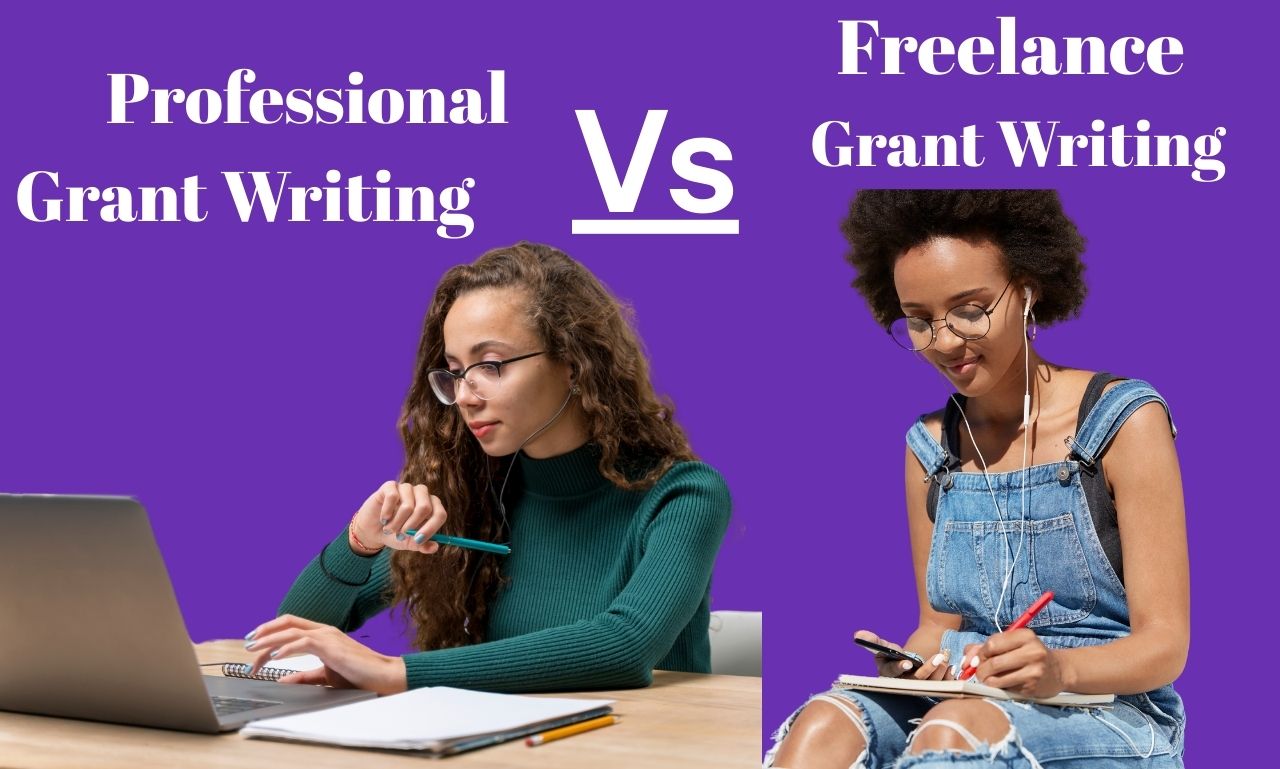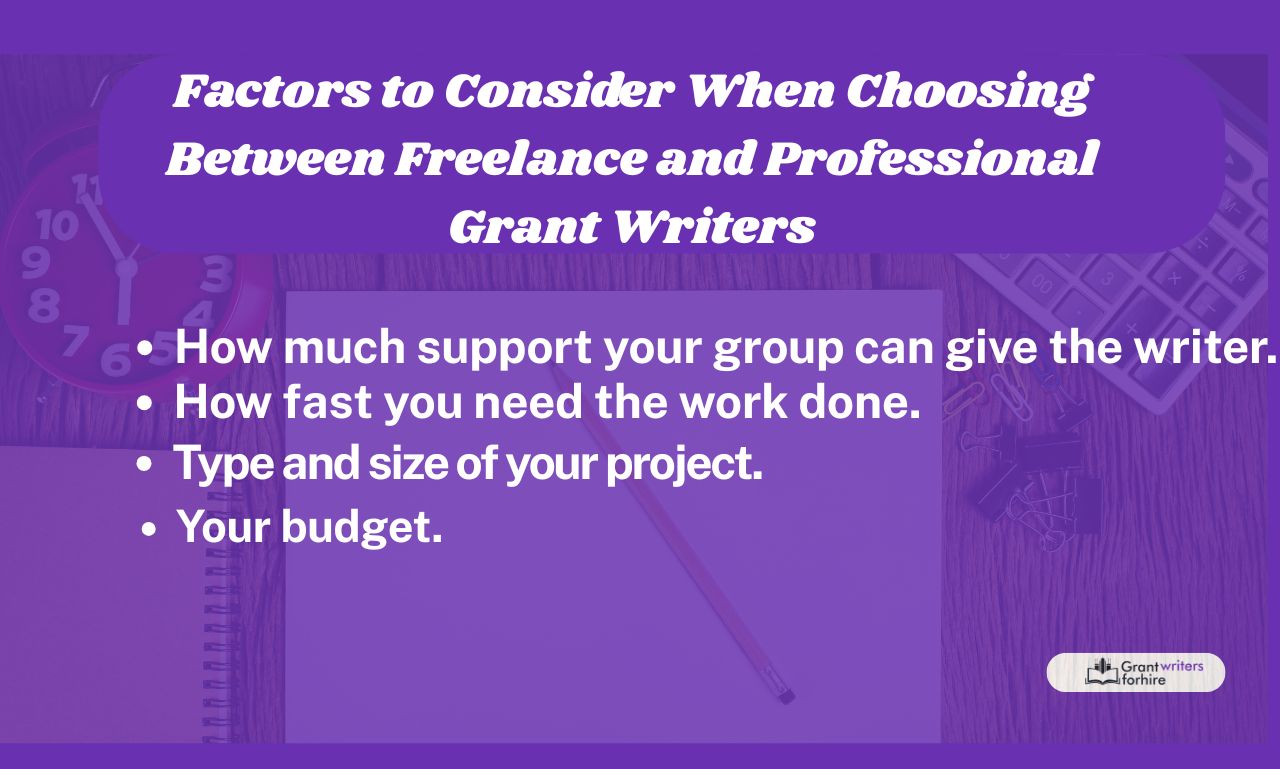Freelance Grant Writer Services Vs Professional Grant Writing
When seeking funding through grants, choosing the right type of grant writer is important. A professional is better than a freelancer grant writer in terms of quality, but a freelancer is mostly cheaper.

What Is a Freelance Grant Writer?
A freelance grant writer is someone who works on their own to help people or groups apply for funding. They are not hired full-time by one company but take different jobs from many clients. Their main role is to write clear, strong proposals that explain why a project or group should get financial support.
Freelance grant writers often have skills in writing, research, time management, and communication. They know how to follow funder guidelines, prepare budgets, and present information in a simple, convincing way.
These writers are helpful for groups that need short-term or one-time help. Many industries hire freelance grant writers, including nonprofits, schools, health centers, and small businesses. They are also hired by arts groups, research programs, and community projects.
Freelancers are popular because they offer flexibility, lower costs, and focused support for specific projects.
What Is a Professional (Agency or In-House) Grant Writer?
A professional grant writer is someone who works full-time for a company, agency, or organization and helps write funding proposals.
These writers are often part of a team and are hired to work on grants regularly. They are called professional because they have strong training and years of experience in writing successful proposals. Some work in-house, meaning they are employees of one organization and focus only on that group’s funding needs. Others work for agencies that serve many clients at once.
Agency writers often handle big projects and follow detailed systems to complete the work while on the other hand In-house writers usually know their organization well and help plan long-term funding goals.
Most professional grant writers have degrees, training in writing or fundraising, and a strong record of winning grants. Their knowledge helps them follow funder rules and present the project in a clear way. Whether in-house or agency-based, professional grant writers are trusted for their skill, speed, and results.
Freelance Grant Writing: Key Advantages
Freelance grant writing offers many helpful benefits for people and organizations looking for funding.
One big advantage is flexibility, freelancers can work on your schedule and are often available even with short notice. They are also cost-efficient because you only pay them for the work they do, without covering extra costs like office space or full-time salaries.
Freelancers bring special skills to each project, such as strong writing and deep research knowledge. You can hire someone who knows your type of project or industry very well. This is great when you need expert help for a short time.
Freelancers are also perfect for one-time or short-term projects, like applying for a single grant or meeting a tight deadline. They help small groups or startups that do not need a full-time writer but still want a quality proposal. In general, freelance grant writing gives you access to skilled support without long-term commitments.
Freelance Grant Writing: Potential Disadvantages
Freelance grant writing has some downsides that people should think about before hiring. One problem is that freelancers may not always be available when you need them, especially if they have other clients. This can make it hard to meet important deadlines.
Another issue is that the quality of work can vary. Since freelancers work alone, there is no team leader or manager to check their work. This means some proposals might not meet the best standards.
Freelancers also may not know much about your organization, which can lead to missing key details in the proposal. Without deep knowledge of your goals, programs, or past work, it can be harder to write a strong and personal grant request.
In some cases, the lack of regular contact can slow down progress. These limits can affect the chances of getting funding if not managed well. So, it is important to plan ahead and communicate clearly when working with a freelancer.
Professional Grant Writers: Main Benefits
Professional grant writers offer many strong benefits, especially for groups that apply for funding often. One big advantage is that they follow a clear and structured process, which helps make sure each proposal is complete and follows all rules. They also use methods that have worked in the past, which can improve the chances of winning grants.
When working in-house or with an agency, these writers can talk easily with staff members and learn more about the organization. This helps them plan better and create proposals that match long-term goals.
Professional writers also take more responsibility for their work since they are part of a team and answer to managers or directors. Their work is often checked by others, which helps improve quality. They also understand the organization’s mission and can show that clearly in the writing.
This close connection can help make the grant application stronger and more focused. Overall, professional grant writers bring strong systems, teamwork, and clear writing to support an organization’s success.
Professional Grant Writers: Common Limitations
Professional grant writers, while helpful, also have some limits that are important to understand. One main issue is the cost of hiring a full-time writer or working with an agency can be expensive, especially for small groups with limited funds. These writers are often paid higher fees because of their experience and the extra services they offer.
Another challenge is that they may not be as flexible as freelancers. They usually follow strict schedules and might not take on very small or urgent projects. For new or small organizations, this structure can feel too formal or slow.
Professional writers also focus more on long-term planning, which may not be helpful if you only need help with one grant. Their work often requires meetings, reviews, and steps that take more time.
Because of this, some groups might find it easier to work with a freelancer for quick or simple tasks. It is important to think about your needs and budget before deciding to hire a professional grant writer.
Factors to Consider When Choosing Between Freelance and Professional Grant Writers

When choosing between a freelance and professional grant writer, there are several important things to think about. First, look at the type and size of your project. If it is a big or long-term project, a professional grant writer may be better. But if it is a small or one-time project, a freelancer might be the right fit.
Next, think about your budget. Freelancers often cost less, which helps if money is limited. You should also think about how fast you need the work done. If the deadline is very close, a freelancer may be more flexible and available.
Another thing to check is how much support your group can give the writer. Professional writers often need help from staff to get details and documents. Choosing the right writer depends on matching your project’s needs with the writer’s skills, cost, and time.
When to Choose a Freelance Grant Writer
A freelance grant writer is a good choice when your project is small, short-term, or has a tight deadline. They are helpful when you do not need ongoing support but still want a strong proposal. Freelancers are also a good fit for new or small organizations that can not afford full-time staff. You can hire them only when needed, which saves money.
They are also useful if you need help during busy times or when your in-house team is unavailable. When choosing a freelance grant writer, look for someone who is reliable, meets deadlines, and communicates well. It helps if they have experience with your type of project or know the kind of funders you are targeting. They should also be good at working alone and handling feedback. A freelance writer with these traits can help you get your proposal done quickly and professionally without extra costs.
When to Choose a Professional Grant Writer
A professional grant writer is the right choice when your organization needs long-term funding help or works on many grant applications each year. They are also helpful when your projects are large, complex, or need detailed reporting and planning. If your team is busy or not trained in grant writing, hiring a professional brings strong support.
These writers understand funding rules, know how to plan ahead, and can write proposals that match your group’s goals. They are a good fit for schools, hospitals, nonprofits, and other groups that depend on steady funding. To get the best results, it helps to include the writer in your planning team. Share your goals, timelines, and updates with them so they can write better proposals.
A professional writer who works closely with your staff can create strong and clear applications that show what your group really needs. This teamwork leads to better results and builds a strong funding plan for the future.
Cost Comparison: Freelance vs Professional Grant Writers
When comparing the cost of freelance and professional grant writers, it is important to look at how they charge and what you get in return. Freelance grant writers often charge by the hour, by the project, or by the number of pages. Their prices can be lower, which helps small groups or one-time projects. Professional grant writers, especially those in agencies or full-time roles, usually charge more because they offer extra services and full support.
They may have flat fees, monthly retainers, or full-service packages. Sometimes there are hidden costs, like paying for extra research, editing, or meetings. Freelancers may seem cheaper at first, but if the quality is low or you miss a deadline, it could cost more later. Professional writers may charge more upfront, but they often give better structure, planning, and results. To choose wisely, think about your budget, the size of the project, and how much support you need throughout the process.
Grant Writing Success Rates: Does It Depend on the Type of Writer?
When it comes to winning grants, the success rate often depends more on the writer’s experience than whether they are freelance or professional. A skilled writer who understands funding rules, writes clearly, and has a record of past wins is more likely to help you get results. Some freelancers have years of success and know how to handle many types of grants. At the same time, some professional writers in agencies may be new or not know your field well. What matters most is how well the writer understands your project and the funder’s needs.
A good writer, no matter where they work, will ask the right questions, follow instructions, and stay on schedule. Their success comes from strong research, clear writing, and teamwork with your organization. So instead of focusing only on the title or setting, choose a writer based on their results, experience, and how well they can support your goals.
Professionalism Matters in Grant Writing
In grant writing, being professional is one of the most important parts of getting good results. Whether the writer is freelance or works in an agency, how they handle the process can affect the outcome. A professional approach shows the writer is serious, prepared, and ready to support the organization’s goals. Reasons as to why professionalism matters is included in the explanation below;
The Explanation:
There are several reasons why professionalism matters. First, professional writers follow rules and meet deadlines, which is important because late or incomplete proposals are often rejected. Another reason is that they communicate clearly with the team, helping everyone stay on the same page.
These writers stay organized and manage each step carefully, so nothing is missed.
Professional grant writers also keep the writing clear and respectful, which funders expect. They understand how to follow funder instructions and write in a way that builds trust. All of this helps improve the chances of getting approved. A professional style shows respect for both the client and the funding organization.
Freelance Grant Writing FAQs
Can a freelance grant writer guarantee funding?
No, no writer can promise funding because the final decision is made by the funder, not the writer. A good writer can improve your chances but cannot offer a guarantee.
How do I verify a grant writer’s experience?
You can ask for samples of past work, check reviews or testimonials from other clients, and request a list of grants they have worked on successfully.
Is it more cost-effective to hire freelancers or professionals long-term?
Freelancers may cost less for short-term or one-time projects. However, professional writers may offer better value for ongoing or complex needs, depending on your goals and budget.
What are red flags to watch out for in either option?
Be careful if a writer guarantees funding, avoids sharing past work, or gives unclear or changing prices. Always choose someone who communicates clearly, has good reviews, and understands your project needs.

